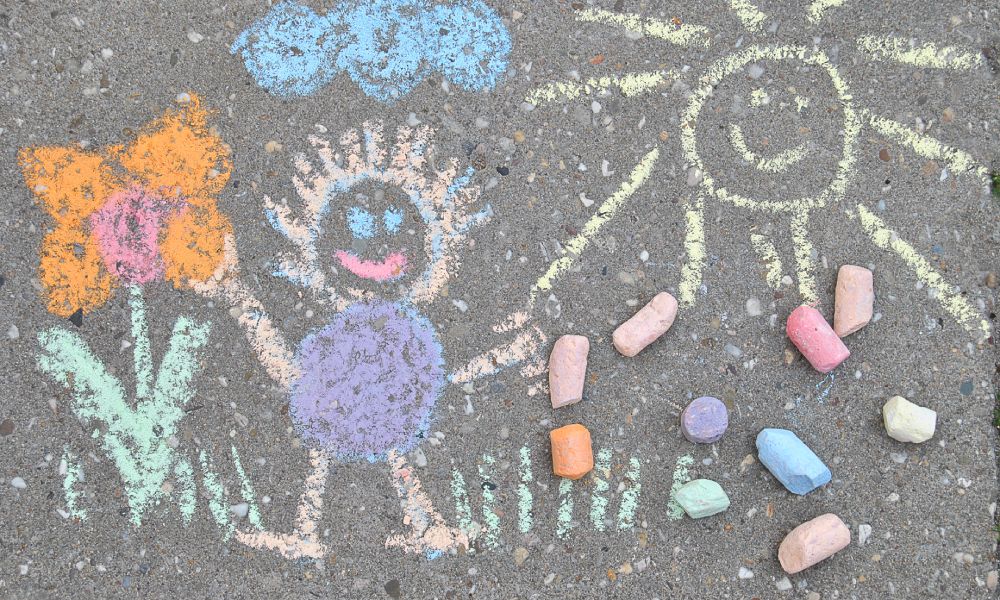Chalk has been a staple of childhood play for generations, transforming driveways and sidewalks into vibrant canvases of imagination. Its roots trace back to ancient civilizations where chalk was used for art and education.
Today, it remains a beloved tool for learning and creativity, fostering a host of developmental benefits in children. In this article, we’re exploring the vast and varied developmental benefits of playing with chalk and how families can encourage games, creativity, learning, and memories with one simple tool.
Cognitive Development
The act of drawing with chalk ignites a child’s creative fire and encourages them to express ideas visually. It’s not just about pretty pictures; it’s about enhancing spatial awareness as children learn to organize shapes and patterns.
Problem-solving skills get a boost, too, as kids figure out how to transform their imaginative designs into reality. Whether they’re creating a chalk cityscape or crafting a hopscotch grid, each stroke of chalk fosters cognitive growth and ingenuity.
Physical Development
Chalk play is a fantastic way to develop fine motor skills as children grip and maneuver the pieces to create detailed drawings. This activity strengthens hand-eye coordination and dexterity, which are vital for writing and other daily tasks.
The fun doesn’t stop there; activities like hopscotch engage gross motor skills, encouraging jumping, balancing, and running. These physical challenges promote overall coordination and fitness, turning playtime into a healthy, active experience.
Social and Emotional Development
Playing with chalk provides ample opportunities for social interaction, whether it’s collaborating on a mural or competing in a game of four square. These shared experiences strengthen friendships and build teamwork skills, teaching kids the value of cooperation and communication.
Additionally, outdoor chalk play offers emotional well-being benefits, as children enjoy fresh air and sunshine while expressing themselves freely. Parents can join in, too, creating lasting memories and fostering a supportive environment for their kids.
Emotionally, children can gain the following benefits from chalk games and activities:
- Self-Expression: Chalk allows children to express their thoughts and emotions creatively, providing an outlet for feelings and helping them navigate complex emotions.
- Stress Relief: Engaging in art and play is calming and can reduce anxiety and stress by allowing kids to focus on their creativity rather than their worries.
- Boosting Confidence: Completing a chalk drawing or winning a game can instill a sense of accomplishment and enhance a child’s self-esteem and confidence in their abilities.
Educational and Academic Benefits
Chalk activities seamlessly blend learning with play, making educational concepts more accessible and enjoyable for young minds. Kids can practice early literacy and numeracy through chalk-drawn letters and numbers, while science comes alive with sidewalk experiments.
Children can explore physics by rolling balls down chalk-drawn slopes or learning about geometry with intricate designs. The tactile experience of chalk encourages curiosity and a love of learning that extends beyond the classroom.
Playing with chalk offers an array of developmental benefits, from sparking creativity to enhancing motor skills and promoting social bonds. Parents and educators should encourage children to incorporate chalk activities into their routines, providing opportunities for growth and fun.
And don’t forget to try sidewalk chalk paint games for family fun, adding a splash of color to your play and strengthening family connections. Chalk it up to a simple yet powerful tool that enriches childhood development in the most delightful ways.






